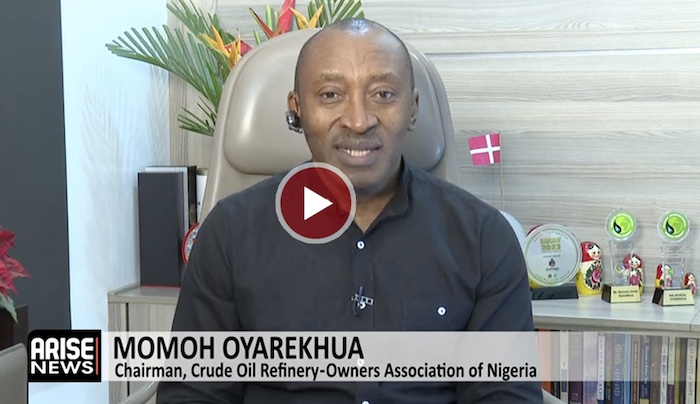Business
Nigeria Implements 15% Fuel Import Duty to Boost Local Refining

The Nigerian government has introduced a new policy mandating a 15% import duty on petrol and diesel, an initiative endorsed by Momoh Oyarekhua, the Chairman of the Crude Oil Refinery Owners Association of Nigeria (CORAN). This decision, approved by President Bola Tinubu, is expected to bolster the local refining sector, alleviate pressure on foreign exchange, and stimulate job creation.
In an interview with ARISE News, Oyarekhua described the implementation of the import duty as a “strategic move” designed to enhance the growth and sustainability of Nigeria’s downstream oil industry. He commended the President for his responsiveness to the needs of the refining sector, noting that this decision follows the approval of the Naira-for-Crude policy, which advocates for the exchange of Nigeria’s crude oil for local currency.
Oyarekhua explained that the new duty would help mitigate the “unhealthy competition” currently faced by local refinery operators, allowing them to thrive in a market heavily influenced by imported petroleum products. “We originally sought an outright ban on petroleum imports,” he stated. “Our goal is for Nigeria to become a net exporter of refined products.”
Currently, Nigeria hosts five operational private refineries, including notable names such as the Dangote Refinery, OPAK Refinery, Watersmith Refinery, Aradel Refinery, and Edo Refinery. These facilities are actively producing and supplying petroleum products to the domestic market. Oyarekhua emphasized that the imposition of the import duty applies solely to foreign products, urging Nigerians to support local refiners.
The chairman pointed to the positive economic impacts already being felt since the Dangote Refinery commenced operations. “We have seen a reduction in foreign exchange rates, which indicates the benefits of local production. Previously, approximately 45% to 50% of our foreign exchange was allocated to fuel imports, but we are now beginning to reduce that dependency,” he explained.
Moreover, Oyarekhua articulated the broader advantages of the import duty policy. It is expected to foster investment, generate employment, and secure energy access for Nigerians. “In times of global crisis, local production guarantees that we continue to have fuel available. Self-sufficiency through local refining is crucial for our energy security,” he concluded.
This policy marks a significant step in Nigeria’s efforts to revitalize its refining industry and reduce reliance on imported fuel, potentially positioning the nation as a future exporter of refined petroleum products.
-

 Health3 months ago
Health3 months agoNeurologist Warns Excessive Use of Supplements Can Harm Brain
-

 Health3 months ago
Health3 months agoFiona Phillips’ Husband Shares Heartfelt Update on Her Alzheimer’s Journey
-

 Science1 month ago
Science1 month agoBrian Cox Addresses Claims of Alien Probe in 3I/ATLAS Discovery
-

 Science1 month ago
Science1 month agoNASA Investigates Unusual Comet 3I/ATLAS; New Findings Emerge
-

 Science4 weeks ago
Science4 weeks agoScientists Examine 3I/ATLAS: Alien Artifact or Cosmic Oddity?
-

 Entertainment4 months ago
Entertainment4 months agoKerry Katona Discusses Future Baby Plans and Brian McFadden’s Wedding
-

 Science4 weeks ago
Science4 weeks agoNASA Investigates Speedy Object 3I/ATLAS, Sparking Speculation
-

 Entertainment4 months ago
Entertainment4 months agoEmmerdale Faces Tension as Dylan and April’s Lives Hang in the Balance
-

 World3 months ago
World3 months agoCole Palmer’s Cryptic Message to Kobbie Mainoo Following Loan Talks
-

 Science4 weeks ago
Science4 weeks agoNASA Scientists Explore Origins of 3I/ATLAS, a Fast-Moving Visitor
-

 Entertainment4 months ago
Entertainment4 months agoLove Island Star Toni Laite’s Mother Expresses Disappointment Over Coupling Decision
-

 Entertainment3 months ago
Entertainment3 months agoMajor Cast Changes at Coronation Street: Exits and Returns in 2025









